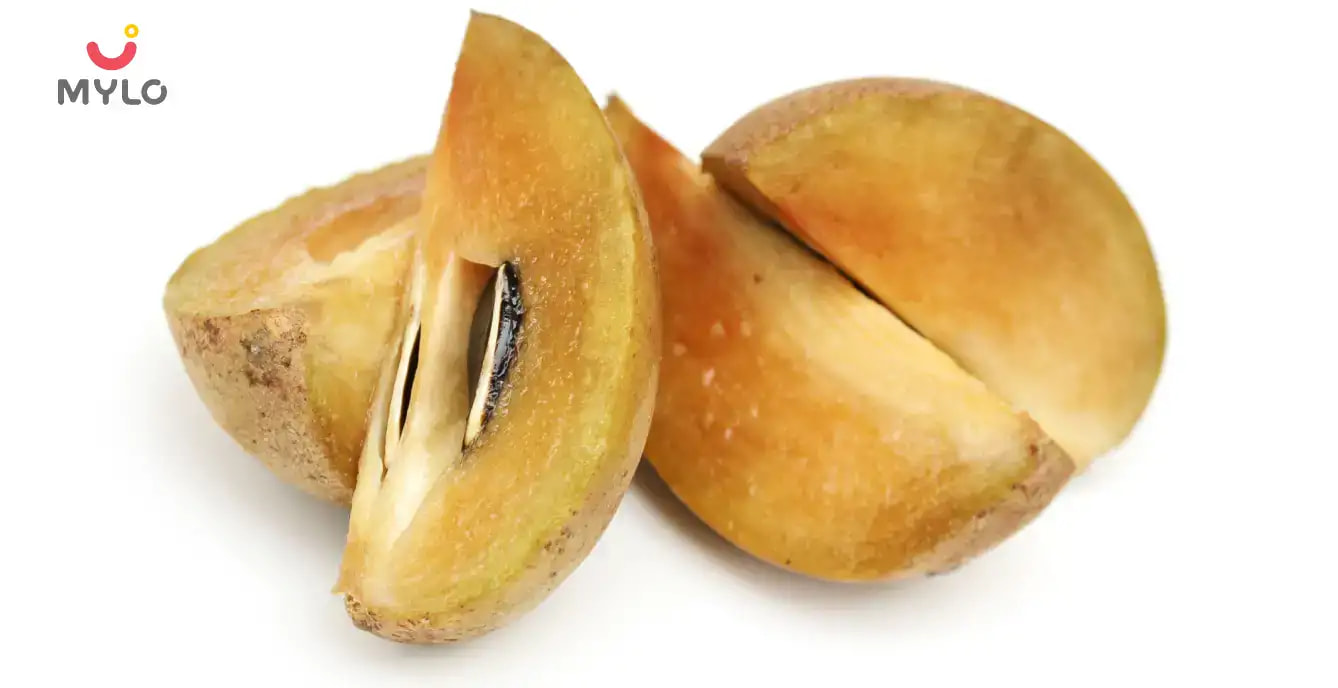- Home

- Food Cravings

- Sapota (Chikoo) During Pregnancy: Benefits & Side Effects
In this Article
Food Cravings
Sapota (Chikoo) During Pregnancy: Benefits & Side Effects
Updated on 3 November 2023



Medically Reviewed by
Mayurakshi Kundu
diabetes, hypertension, obesity and also looked into pregnancy, lactation cases - Masters in Food and Nutrition
View Profile

Pregnancy is a crucial time for a woman, and it is essential to have a balanced and nutritious diet for the healthy growth of the unborn child. Sapota, also known as Chikoo, is a delicious tropical fruit that is commonly found in India and other parts of the world. It is rich in nutrients, fiber, and antioxidants, making it a healthy addition to a pregnant woman's diet. However, like any other food, it is essential to understand the benefits and side effects of consuming Sapota during pregnancy.
In this article, we will explore the advantages and disadvantages of consuming Chiku in pregnancy and also dicuss, how to choose and store it to avoid any potenital health issues.
Nutritional Value of Sapotas
Sapota, also known as chikoo or naseberry, is a highly nutritious fruit with many health benefits. It is rich in vitamins, minerals, and antioxidants that can provide a healthy boost to a pregnant woman's diet. Sapota is rich in calcium, iron, phosphorus, and other essential minerals that can help strengthen bones and improve digestive tract health. Additionally, it contains vitamins A and C, which can boost immunity, improve skin health, and prevent heart disease. However, excessive consumption of chikoo during pregnancy can lead to side effects and should be avoided.
How Many Sapotas Should a Pregnant Lady Consume During Pregnancy?
Doctors often advise pregnant women to increase their daily intake of fresh fruits. Sapota, which has high nutritional value, can be safely consumed by all pregnant women unless their doctor advises against it. There is no specific quota for how many Sapotas a pregnant woman can eat during pregnancy. But, as the fruit is high in calories and sugar content, it is advisable to limit intake to 100 gms of fruit per day. This will help pregnant women to reduce the chances of excessive weight gain and other medical complications.
You may also like: Mango in Pregnancy: Is it Safe to Eat?
Benefits of Chikoo Consumption During Pregnancy
By eating Chikoo during pregnancy, women can get many benefits like
1. Instant energy boost
Chikoo has a high sucrose content which helps to give instant energy. Eating this fruit as a mid-morning snack is a great way for pregnant women to maintain good energy levels between meals.
2. Improved digestion
Constipation is a common complaint among pregnant women. Eating Sapota during pregnancy will help to aid digestion as the fruit has good fibre content. It also helps to relieve nausea and reduces inflammation in the stomach.
3. Strengthens bones
Pregnant women need extra calcium and are often prescribed supplements to maintain proper levels. Chikoo fruit is a natural source of nutrients like calcium, potassium, and iron.
4. Regulates blood pressure
Consuming Chikoo fruit can also help to regulate blood pressure in pregnant women. This fruit has good levels of magnesium and potassium, which are essential for keeping blood pressure in check.
How Should I Choose and Store Sapota During Pregnancy?
Pregnant women should choose their fruits and vegetables carefully to avoid health issues. Selecting a good Sapota fruit is tricky as it is hard to find ripened fruits in the market.
Tips for selecting Chiku in pregnancy:
-
Select Sapotas, which are hard to touch.
-
Check the fruits for blemishes or holes.
-
Discard fruits that emit a bad odour or have wrinkled skin.
-
Fruits that have visible white sap on them have been freshly picked. So try to choose such fruits from the market.
You may also like: Food Poisoning During Pregnancy: Causes, Symptoms & Treatment
Tips for storing Sapota in pregnancy:
-
After buying the Sapota fruits, you should clean and dry them.
-
Place the dry fruits in a rice container to help them ripen faster.
-
Check on the fruits once a day to ensure they do not get spoilt or overripe.
Pregnant women should only eat ripened Sapotas that have a sweet smell and taste.
Side Effects of Consuming Sapota During Pregnancy
Most pregnant women who eat the recommended amount of Chikoo fruits during pregnancy do not experience any side effects. But, for some pregnant women, excessive consumption of this fruit can cause side effects like
1. Excess weight gain
Chikoo fruits are high in calories, so overeating these fruits during pregnancy can cause unnecessary weight gain for the mother-to-be. This excess weight gain can lead to other health complications. As a result, it's better to practice moderation.
2. Increased blood sugar levels
Chikoo fruit contains high sucrose and fructose levels. Excess consumption of Chiku in pregnancy can increase the blood sugar levels and cause gestational diabetes. So, women with diabetes, gestational diabetes or at a risk of developing it should avoid sapotas.
3. Diarrhea
Overeating Chikoo fruit during pregnancy can cause diarrhea. This can result in rapid dehydration and other medical complications, so make sure not to overindulge in Chikoo during pregnancy.
Recipe for a Healthy Chikoo Milkshake
The best way for pregnant women to have the recommended amount of Chikoo fruit and satisfy their cravings is to turn it into a milkshake. Here is a quick recipe to make a healthy Chikoo milkshake.
Ingredients
-
1 or 2 ripened Chikoo fruits
-
1 cup milk
Directions
It's best to avoid adding sugar since Chikoo fruit is already high in sugar content. If you must add some sweetener, you can add 1tsp of honey. Add all the ingredients to a blender and run it for a couple of minutes to get a thick Chikoo milkshake.
Eating sapota during pregnancy is absolutely safe. But pregnant women must eat this fruit in moderation to avoid extra weight gain and gestational diabetes. Pregnant women should take their doctor's advice before including Chiku in pregnancy diet.
References
1. Baskar,M; Hemalatha,G; Muneeshwari, P. (2020). Traditional and Medicinal Importance of Sapota – Review. Department of Food Science and Nutrition
2. Milind, P et al. (2015). Chickoo: A wonderful gift from nature. Guru Jambheshwar University of Science and Technology





Medically Reviewed by
Mayurakshi Kundu
diabetes, hypertension, obesity and also looked into pregnancy, lactation cases - Masters in Food and Nutrition
View Profile


Written by
Ishmeet Kaur
Ishmeet is an experienced content writer with a demonstrated history of working in the internet industry. She is skilled in Editing, Public Speaking, Blogging, Creative Writing, and Social Media.
Read MoreGet baby's diet chart, and growth tips

Related Articles
Related Questions
Influenza and boostrix injection kisiko laga hai kya 8 month pregnancy me and q lagta hai ye plz reply me

Hai.... My last period was in feb 24. I tested in 40 th day morning 3:30 .. That is faint line .. I conculed mylo thz app also.... And I asked tha dr wait for 3 to 5 days ... Im also waiting ... Then I test today 4:15 test is sooooo faint ... And I feel in ma body no pregnancy symptoms. What can I do .

Baby kicks KB Marta hai Plz tell mi

PCOD kya hota hai

How to detect pcos

RECENTLY PUBLISHED ARTICLES
our most recent articles

Diet & Nutrition
গর্ভাবস্থায় আলুবোখরা: উপকারিতা ও ঝুঁকি | Prunes During Pregnancy: Benefits & Risks in Bengali

Diet & Nutrition
গর্ভাবস্থায় হিং | ঝুঁকি, সুবিধা এবং অন্যান্য চিকিৎসা | Hing During Pregnancy | Risks, Benefits & Other Treatments in Bengali

Women Specific Issues
স্তনের উপর সাদা দাগ: লক্ষণ, কারণ এবং চিকিৎসা | White Spots on Nipple: Causes, Symptoms, and Treatments in Bengali

Diet & Nutrition
গর্ভাবস্থায় পোহা: উপকারিতা, ধরণ এবং রেসিপি | Poha During Pregnancy: Benefits, Types & Recipes in Bengali

Diet & Nutrition
গর্ভাবস্থায় মাছ: উপকারিতা এবং ঝুঁকি | Fish In Pregnancy: Benefits and Risks in Bengali

Diet & Nutrition
গর্ভাবস্থায় রেড ওয়াইন: পার্শ্ব প্রতিক্রিয়া এবং নির্দেশিকা | Red Wine During Pregnancy: Side Effects & Guidelines in Bengali
- ইনার থাই চ্যাফিং: কারণ, উপসর্গ এবং চিকিৎসা | Inner Thigh Chafing: Causes, Symptoms & Treatment in Bengali
- গর্ভাবস্থায় ব্রাউন রাইস: উপকারিতা ও সতর্কতা | Brown Rice During Pregnancy: Benefits & Precautions in Bengali
- Velamentous Cord Insertion - Precautions, Results & Safety
- Unlock the Secret to Flawless Skin: 7 Must-Have Qualities in a Face Serum
- Unlock the Secret to Radiant Skin: How Vitamin C Serum Can Transform Your Complexion
- Gender No Bar: 10 Reasons Why Everyone Needs a Body Lotion
- Unlock the Secret to Radiant Skin How to Choose the Perfect Body Lotion for Your Skin Type
- Top 10 Reasons to Apply a Body Lotion After Every Bath
- Communication in Toddlers: Milestones & Activities
- How to Improve Vocabulary for Toddlers?
- A Comprehensive Guide to Understanding Placenta Accreta
- Vulvovaginitis in Toddlers Causes, Symptoms and Treatment
- A Comprehensive Guide to Understanding Cerebral Palsy in Children
- Bitter Taste in Mouth During Pregnancy: Understanding the Causes and Remedies


AWARDS AND RECOGNITION
Mylo wins Forbes D2C Disruptor award
Mylo wins The Economic Times Promising Brands 2022
AS SEEN IN
















At Mylo, we help young parents raise happy and healthy families with our innovative new-age solutions:
- Mylo Care: Effective and science-backed personal care and wellness solutions for a joyful you.
- Mylo Baby: Science-backed, gentle and effective personal care & hygiene range for your little one.
- Mylo Community: Trusted and empathetic community of 10mn+ parents and experts.
Product Categories
baby carrier | baby soap | baby wipes | stretch marks cream | baby cream | baby shampoo | baby massage oil | baby hair oil | stretch marks oil | baby body wash | baby powder | baby lotion | diaper rash cream | newborn diapers | teether | baby kajal | baby diapers | cloth diapers |





